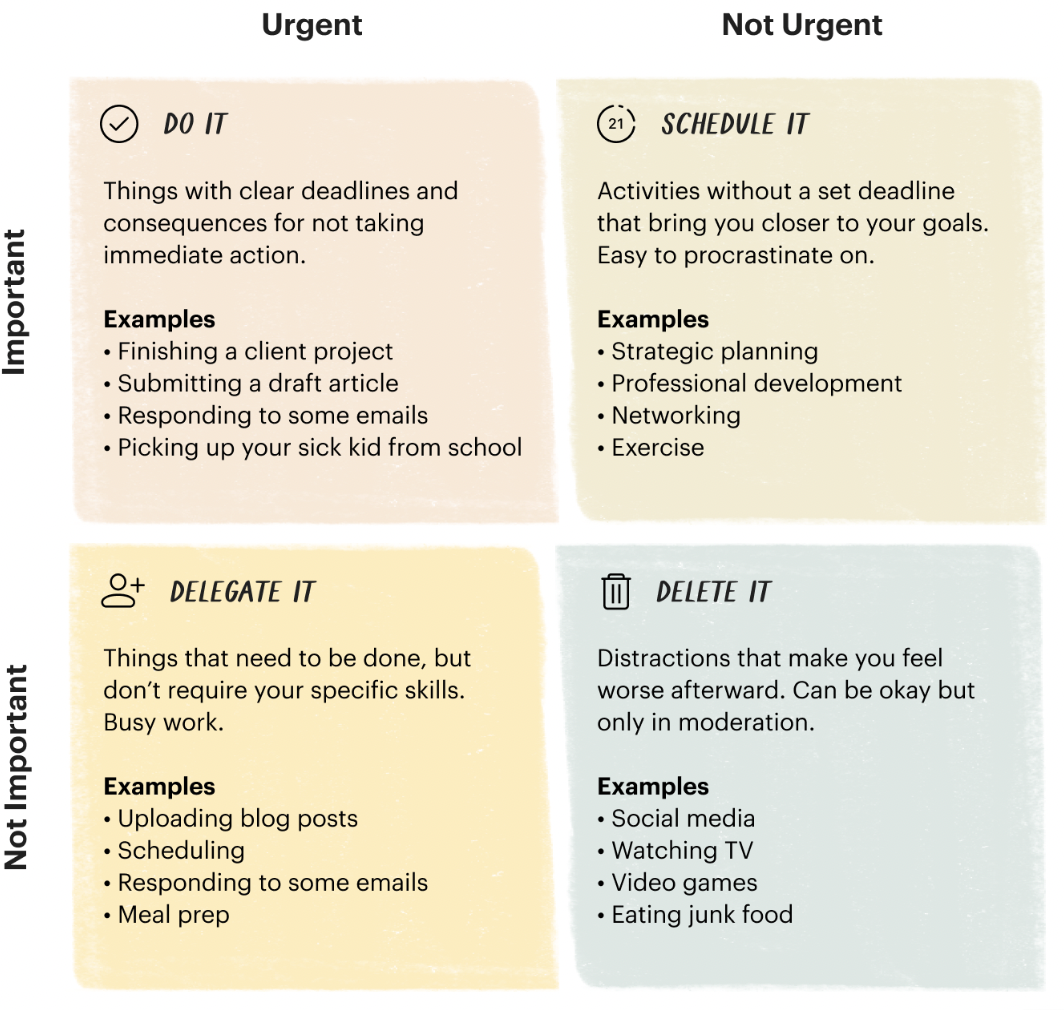Establishing positive rituals in your daily routine can significantly contribute to your overall well-being and productivity. In this regard, I would like to share some crucial insights I've learned during my professional journey to enable you to effectively take charge of your day!
Starting with your mornings by incorporating meaningful activities, prioritizing your goals, efficiently managing your meetings, adopting the Pomodoro technique, minimizing distractions, and paying attention to the gaps in your schedule. By implementing these strategies, you can cultivate a sense of purpose and direction in your life, leading to improved personal and professional outcomes!

1. Own Your Mornings
How you start your day can set the tone for the rest of it. If you wake up feeling rushed, stressed, or unprepared, it's likely that you'll carry those feelings with you throughout the day. That's why it's essential to own your mornings by having a routine that energises and prepares you for the day ahead. What is the best way to get you started? Prepare the night before!
Put your work/gym clothes out, prepare your meal and/or your tasks to be completed the next day! You could wake up a little earlier, exercise, meditate, read, or have a healthy breakfast. Whatever you do, make sure it's something that makes YOU feel good and sets you up for a productive day. Always start your day with YOU, so let's "put your own oxygen mask on first", before helping others!
2. Your Phone Should Stay Out of Bed
( I know, I feel you - but it IS possible)
In today's world, it's challenging to resist the temptation of grabbing our phones as soon as we wake up. But trust me, it's the last thing you should do to kickstart your day on a positive note. Turning off your phone's alarm and putting it away from your reach, such as in another room, can help you avoid distractions and start your day with intention.
It's also essential to resist the urge to check your social media accounts or work emails right after waking up. Scrolling through social media or checking work emails can lead to stress and anxiety, putting you in a negative headspace before you even get out of bed. Instead, take the time to focus on yourself first thing in the morning.
It's crucial to maintain a healthy work-life balance, and checking work emails or chats while still in bed is not an effective way to achieve it. One effective way is to delete all work-related apps from your personal phone, allowing you to concentrate on yourself before tackling the demands of the day. Remember, the world won't fall apart if you take an hour to focus on yourself before diving into work. Don't let the demands of the day control you; take control of your mornings to set yourself up for success!
3. Use your affirmations
Positive affirmations are statements that you repeat to yourself (best in the morning in front of the mirror) in order to promote positive thinking and self-empowerment. They are usually short, simple phrases that are designed to counteract negative thoughts and beliefs that may be holding you back.
Positive affirmations can be used to help you achieve a wide range of personal and professional goals, such as building confidence, overcoming self-doubt, reducing stress and anxiety, improving relationships, and achieving career success. By regularly incorporating positive affirmations into your daily routine, you can train your mind to focus on the positive aspects of your life and develop a more positive and optimistic outlook overall.
- I am capable and confident in my abilities.
- I am grateful for the opportunities that come my way.
- I trust my instincts and make wise decisions.
- I am worthy of success and abundance.
- I am focused and productive in all that I do.
- I am surrounded by positivity and support.
- I am healthy, strong, and energized.
- I am constantly growing and learning.
- I am in control of my thoughts and emotions.
- I am making a positive impact on the world
4. Insert Your "Big Rocks" in your calendar
You probably have an extensive list of tasks that you need to complete, but not all of them are equally important. That's where the "big rocks" come in. These are the critical tasks that you need to accomplish that day, and they should be your main priority. Put these tasks into your calendar before it fills up with small tasks or unnecessary meetings. Use the MoSCoW technique to help you decide what you must and should accomplish that day, and what you can leave for tomorrow. When you have completed the "must" or "should" tasks, then you can see if you have any time left for "could haves" or "nice to haves".
5. Prioritise and Do It Correctly
Prioritising can be tricky, but it's essential to make sure you're spending your time on the right tasks. Stephen Covey's strategy in his book, The 7 Habits of Highly Effective People, suggests that all tasks should be categorised (and then prioritised) according to importance and urgency
Use the Eisenhower Matrix:

- Urgent and important: These tasks should be done first
- Important but not urgent: Block off time on your calendar to get this done without interruption
- Urgent but unimportant: Delegate. Delegate. Delegate.
- Neither urgent nor important: Remove from your do list
Once everything is written down, prioritisation typically happens according to each task's importance, urgency, length, and reward.
6. Manage Your Meetings
Meetings can be time-consuming, unproductive, and, at times, unnecessary. That's why it's crucial to manage your meetings effectively. Be conscious of your time and decline meetings you don't see the point of attending. Ask questions like:
"What is the purpose of the meeting, does it really need to be a meeting?"
"What is the desired outcome?"
"What is your role/input in that meeting?" (in case you need to prep)
"What is the agenda of the meeting?"
"Action points and deadline?"
7. Eliminate Distractions & use Pomodoro
Distractions can seriously impact your productivity and focus. Turn off your phone, especially social media notifications, or put it on silent mode. Remove social media apps from your phone if possible, and schedule social media time later in the day. Use website-blocking apps or browser extensions to limit your access to distracting websites during work hours. Consider using noise-cancelling headphones or finding a quiet workspace to minimize noise distractions.
Additionally, avoid multitasking, as it can decrease productivity and increase the likelihood of errors. Instead, focus on one task at a time and complete it before moving on to the next. Set aside specific times for email checking and responding to avoid constantly interrupting your workflow. By eliminating distractions, you can maximize your concentration and get more done in less time.
The Pomodoro technique is a time management strategy that can be beneficial for creating focus time. It involves setting a timer for 25 minutes and focusing on a single task until the timer rings. When your session ends, mark off one Pomodoro and record what you completed. Then enjoy a five-minute break. After four Pomodoros, take a longer, more refreshing 15-30 minute break.
8. Take a break

It is widely known that as human beings, our bodies and minds require sufficient rest. Incorporating regular breaks of 5-10 minutes can significantly enhance productivity by allowing individuals to switch off and recharge. Simple activities such as stretching, walking or getting a drink can be highly beneficial during these breaks. While it may be tempting to keep refreshments in the office, it is recommended to take a quick stroll to the kitchen instead. Additionally, taking a longer break once or twice a year to visit new places or engage in different activities is highly recommended as it promotes a change of environment and helps to reduce stress levels.
9. Batch Similar Tasks
10. Delegate
Delegation can help to build trust and empower team members by giving them the opportunity to take on new responsibilities and grow their skill sets. Effective delegation involves identifying tasks that can be delegated, selecting the right person for the task, providing clear instructions and guidelines, and setting clear expectations for the outcome. It also has the potential to improve the overall efficiency and effectiveness of the team or organization. By distributing tasks among team members, the workload is balanced, and deadlines are more likely to be met. It also allows for better utilization of resources and prevents burnout among team members who may be overworked or overwhelmed.
Developing positive habits, a positive mindset, and a routine can have a significant impact on your personal and professional life. By owning your mornings, prioritizing your tasks, managing your meetings, using the Pomodoro technique, eliminating distractions, taking breaks, practising gratitude, embracing failure, learning something new every day, and practising self-care, you can achieve your goals and live a happier, healthier, and more fulfilling life.







